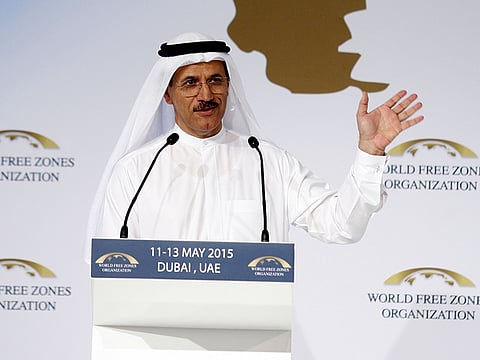UAE to invest in post-war Iraq, Yemen
Economy minister says economic growth and job creation crucial to maintaining stability

Dubai: The UAE will invest in post-war Iraq and Yemen in an effort to stabilise the two war-torn countries through economic growth and job creation, Sultan Bin Saeed Al Mansouri, UAE Minister of Economy, told Gulf News on Tuesday.
The Iraqi government is facing a $22 billion (Dh80.8 billion) budget deficit this year as the fight against Daesh (the self-proclaimed Islamic State of Iraq and the Levant) and sustained weak oil prices take their toll.
Meanwhile, Yemen’s ailing economy has been dealt a blow by the current instability that has seen the president and his government forced into exile.
Speaking to Gulf News at the World Free Zones Organisation’s (World FZO), first annual conference in Dubai, Al Mansouri said there will need to be an end to the fighting in Iraq and Yemen before the UAE invests.
“We need stability for any kind of investment. Once the stability comes, then also we can move in there,” he said. “I’m talking about investments here. I’m talking about needs, job generation, that’s got to come. It’s very important.”
The UAE has been investing in the region for years through its state-owned funds in what Al Mansouri said, is a move that creates “jobs to create stability.”
The UAE is seen as one of a few political and economically stable countries in the Middle East. It has emerged as a major regional economic powerhouse, attracting some of the world’s largest multi-nationals. However, geopolitical issues do have a ripple effect and can impact trade flows and business in the country.
Meanwhile, unemployment is high in Iraq, where large swathes of the country are under the control of Daesh. It is also high in Yemen, where Al Qaida’s most dangerous franchise has established itself. Meanwhile, the UAE is a member of the United States-led campaign that is launching air strikes against Daesh in Iraq and Syria, and is also a member of the Saudi Arabian-led coalition launching air strikes against Al Houthi rebels in Yemen.
Al Mansouri did not state how much the UAE would invest in the two countries once fighting ended or if the government had identified any particular investment or infrastructure projects.
He, however, suggested that the investment would come from state-owned entities and would not be aid.
“We’ve been doing something about this for the last five, six or seven years, which is our funds investing around the region,” he said.
Unemployment and adverse conditions were major grievances of the Arab Spring protesters that started in Tunisia in 2010 and spread across the region, including to Yemen. The protests eventually saw the overthrow of governments in Tunisia, Egypt and Yemen.
Earlier this year, the UAE, along with Saudi Arabia and Kuwait, pledged $12 billion in investment in Egypt. Meanwhile, a number of private and state-linked UAE companies have committed to investing in Egypt since the election of President Abdul Fattah Al Sissi.
Al Mansouri told an audience at the conference, “stability in the region can only be achieved with stability of the economy”.
Sign up for the Daily Briefing
Get the latest news and updates straight to your inbox


